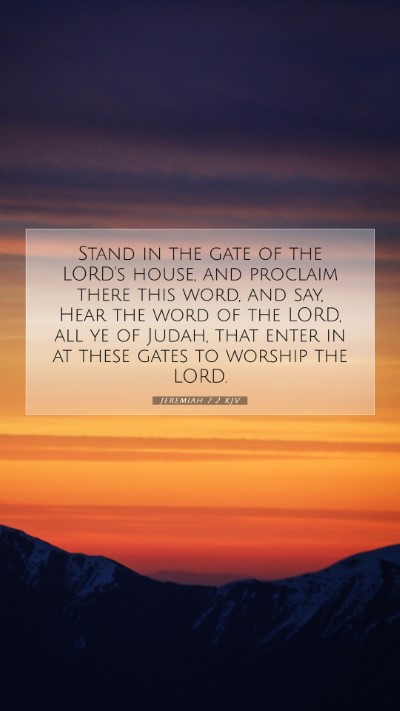Understanding Jeremiah 7:2: A Composite Commentary
Introduction
The Bible verse Jeremiah 7:2 states:
"Stand in the gate of the Lord's house, and proclaim there this word, and say, Hear the word of the Lord, all ye of Judah, that enter in at these gates to worship the Lord."
This verse highlights a significant moment in the prophetic ministry of Jeremiah, emphasizing the call to worship and divine expectations. The interpretations drawn from various public domain commentaries provide a comprehensive understanding of the verse.
Biblical Context
Jeremiah's ministry occurred during a tumultuous period for Judah, as the nation faced impending judgment from Babylon. The preceding chapters outline the people's infidelity and the temple's false security. In this verse, Jeremiah is instructed to proclaim a message at the entrance of the temple, a poignant spot symbolizing public worship and communal identity.
Insights from Public Domain Commentaries
-
Matthew Henry:
Henry notes that standing in the gate represents a place of authority and visibility. It signifies the urgency of the message which confronts the worshippers directly. He emphasizes that true worship must be accompanied by sincere obedience, thus highlighting the disconnect between ritual and righteous living.
-
Albert Barnes:
Barnes stresses that this call is not merely for attention but for a deeper engagement with God's word. By proclaiming at the gates, Jeremiah seeks to awaken the hearts of worshippers, reminding them that entering the temple requires a readiness to obey God’s commandments.
-
Adam Clarke:
Clarke elaborates on the implications of entering the gates. He interprets this as a summons to reflect on the moral and spiritual state of the people. Clarke’s commentary suggests that genuine worship extends beyond physical acts to embody a life transformed by faith and obedience.
Key Themes in Jeremiah 7:2
-
Proclamation of God’s Word:
Jeremiah's call represents a divine imperative to communicate God’s expectations. The act of standing in the gate suggests that God's message must reach all who come to worship.
-
Preparation for Worship:
The verse indicates a need for inward preparation among worshippers. Jeremiah's proclamation serves as a spiritual wake-up call for those entering the temple.
-
The Link Between Worship and Conduct:
The commentaries collectively affirm that the ritual of worship should align with the moral conduct of the worshipper. True worship is reflective of one’s life in obedience to God.
Applications for Today
-
Understanding Scripture:
As we engage with this verse, it's crucial to seek understanding of both the historical and spiritual contexts. Applying insights from Jeremiah facilitates deeper Bible study.
-
Engagement in Worship:
This verse challenges modern worshippers to assess their motivations and lifestyle. Are we entering our places of worship with hearts prepared to listen and obey God?
-
Call to Action:
In a world where distractions abound, Jeremiah's urgent message compels us to stand firm in our faith and to declare God’s truth at every opportunity.
Cross References
- Isaiah 1:10-20: A call for true worship and repentance.
- Ezekiel 18:30: A call to turn from sin and live.
- Matthew 15:8-9: Jesus quotes Isaiah about the worshippers' hearts being far from God.
Conclusion
Jeremiah 7:2 serves as a powerful reminder of the relationship between worship and righteousness. The insights from various commentaries encourage believers to seek a deeper understanding of their faith and the significance of their actions as they approach God in worship. This verse calls for ongoing reflection, urging us to harmonize our worship with our everyday conduct, ensuring our lives reflect the values and truths of Scripture.


